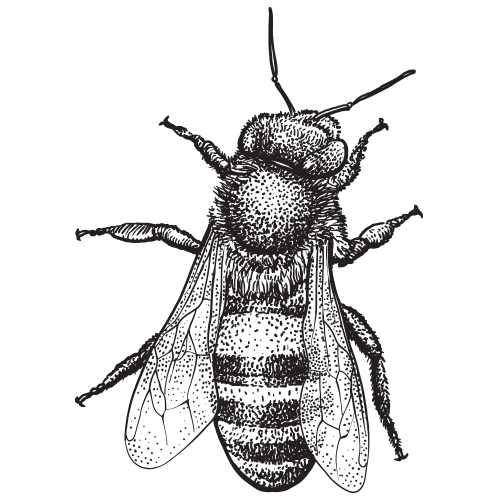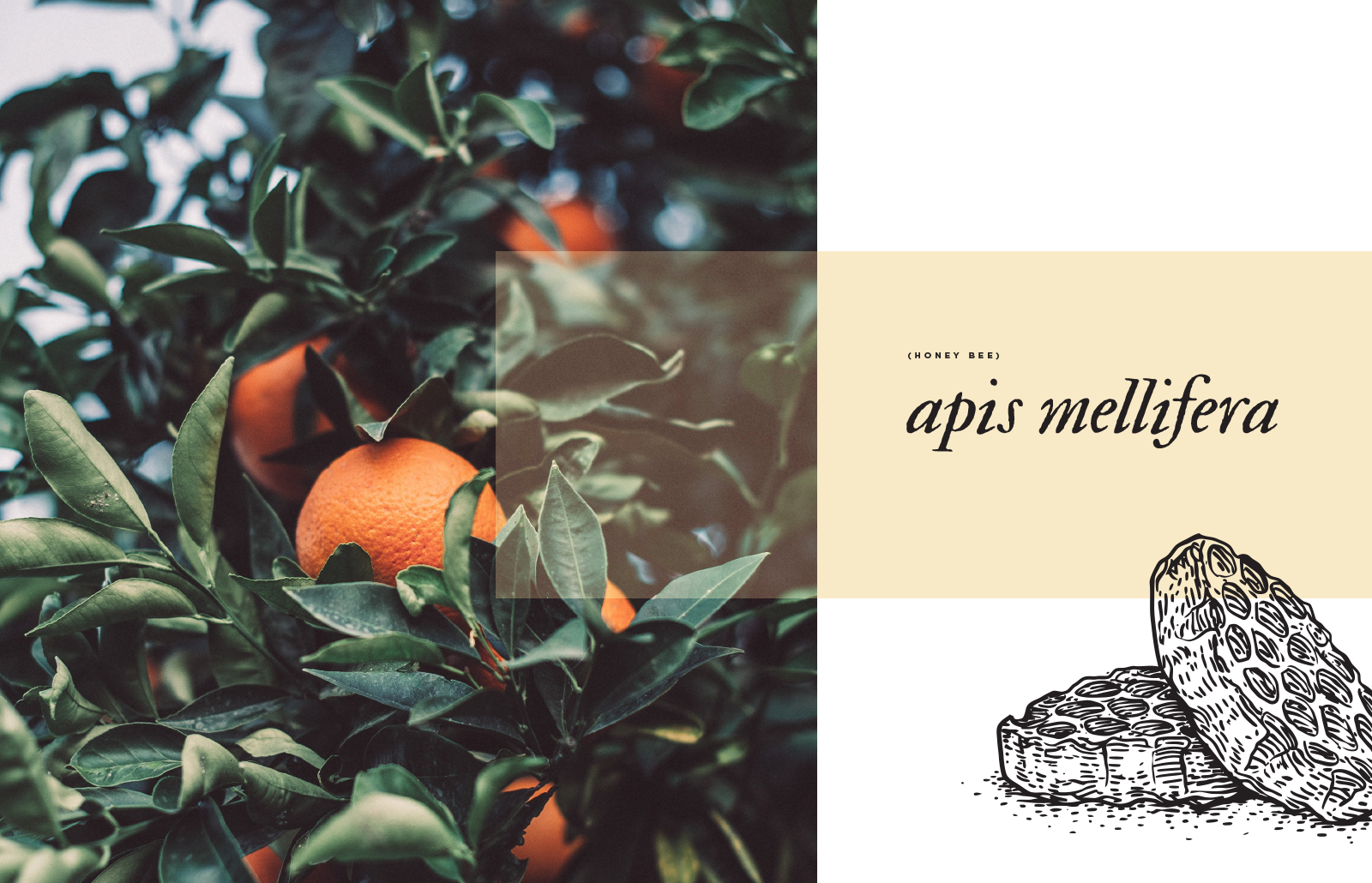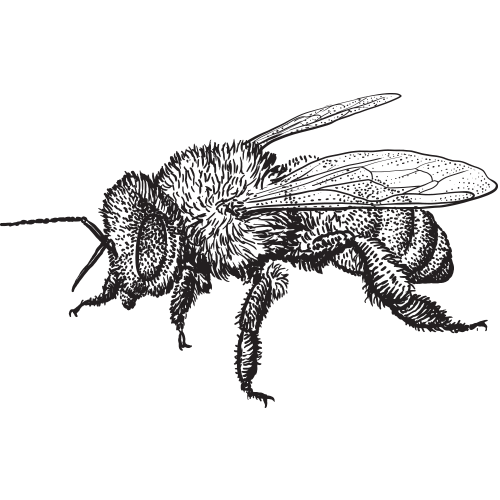Local beekeepers combine conservation with business
 You know honey bees make honey. You even know, at least in the back of your mind, that they’re important pollinators. And you probably know that bee populations are declining and that it’s something we should care about.
You know honey bees make honey. You even know, at least in the back of your mind, that they’re important pollinators. And you probably know that bee populations are declining and that it’s something we should care about.
What we don’t often think about is how important bees are to the local economy here in Polk County and how many livelihoods depend on those little bees. Small business owners all over Polk County have built their livelihoods on honey bees, and declining bee populations have made tangible impacts on their businesses.
HONEY BEES ARE THE CORNERSTONE OF A FAMILY BUSINESS
Forty years ago, Clay Sadler’s grandfather started keeping bees as a hobby. The scope of his hobby grew and grew, and, 15 years ago, Bee-Haven Honey Farm was born.
Today, Bee-Haven is a thriving family business that manages around 2,000 beehives. From the gallberry bushes of North Florida to the orange groves of Polk County, Bee-Haven employees move their hives from place to place, following flowers that will make the best honey. Moving the hives is arduous work — they must be transported at night, while the population of the hive is all home from their foraging — and driven from one location to another.
The result is honey that, in many ways, is a much higher-quality than what you’ll find in grocery stores.
“Most of the honey you see on grocery store shelves is imported,” says Clay Sadler, one of Bee-Haven’s owners. That imported honey may come from bees that are fed with high-fructose corn syrup or sugar instead of feeding on nectar from flowers.
Producing high-quality honey is increasingly challenging. Sadler, like many others, is concerned about the world’s bee population, which is declining due to colony collapse disorder, pesticides, and other issues. He also worries about other issues that make it harder for his bees to make honey. One of those factors is citrus greening, a disease that affects citrus trees’ ability to flower and fruit.
“It’s hard to find pure orange blossom honey,” explains Sadler. “To call it ‘orange blossom’ honey, it only needs to be 51 percent orange blossom. The rest can be a blend.”
But, because Bee-Haven focuses on producing high-quality honey that exceeds that standard, greening is an increasingly worrisome problem. For now, though, Bee-Haven’s bees are still stationed throughout orange groves every season, gathering pollen and nectar from the trees.
Bee-Haven’s honey is important to other businesses, too. One of the businesses that depends on high-quality, local honey is Garagiste, a meadery in Tampa.
“We’ve always believed our product should be anchored in using only the best ingredients and, to the extent possible, always locally produced,” says Chad Wiltz, president and CEO of Garagiste Meadery. “Bee-Haven was an easy choice which perfectly reflects our commitment to putting our local community first.” It also doesn’t hurt that, in Wiltz’s words, “Their product is consistently above the industry standard.”
Honey from Bee-Haven’s hives contribute to other businesses, too. They’re stocked mostly in smaller shops that emphasize local foods. Chamberlin’s, a health-food store with two locations in Lakeland; Lucky’s Market, which will open in Lakeland soon; and Harvest Meat Market all stock Bee-Haven honey.

LOCAL FARMERS DEPEND ON BEES FOR POLLINATION
Honey bees aren’t only good for honey; they are also important to the vast majority of fruits and vegetables we eat every day. Keeping bees for pollinating crops is a big business in the United States, including here in Polk County.
For Nelson Kirkland, owner and manager of Kirkland Farms in South Lakeland, bees are an absolute necessity. He depends on honey bees to pollinate his blueberry bushes; without them, the bushes would never produce fruit. “Everything that is a fruit or a vegetable requires pollination,” explains Kirkland.
His farm, which includes 43,000 blueberry plants on about 15 acres, depends specifically on honey bees for fruit production. To ensure the best-possible blueberry crop, Kirkland rents bees that pollinate his blueberry bushes when they’re blooming. “The bees are present for the entire bloom,” Kirkland says. He notes that the bees work for four to six weeks pollinating blueberry flowers. A few weeks later, his bushes are loaded with fruit.
Small business owners all over Polk County have built their livelihoods on honey bees, and declining bee populations have made tangible impacts on their businesses.
Kirkland rents his bees from Robbie Bell, who has been a beekeeper for nearly 40 years and who owns Bell Apiaries. Bell works with thousands of hives and hundreds of millions of bees, which he uses as agricultural pollinators all over the United States. From Kirkland’s small farm in South Lakeland to Polk County’s orange groves to the almond orchards of California, Bell’s bees pollinate plants that produce fruits and vegetables that are exported all over the country and the world.
LOCAL APIARIES HELP FEED THE WORLD
The bees at Bell Apiaries pollinate other plants, too. Recently, Bell supervised transporting thousands of hives to California’s San Joaquin valley, where bees will spend several days pollinating the area’s vast almond groves.
Transporting bees for pollination is a relatively recent phenomenon. “Twenty years ago, you weren’t hauling bees up and down the highway,” says Bell. “It’s a stressor for them.”
Bell explains that a rising demand for fruits and vegetables and declining local pollinator populations result in a desperate need for honey bees. “There are no more natural pollinators because of the insecticides and pesticides they use in farming,” Bell explains. He cites almonds as one example for sky-high demand for bees: the California almond crop requires 2.6 million commercial bee hives for pollination. California only has about 16,000.
While Bell’s bees are in high demand, he does worry about them. To meet high demands for fruits and vegetables, farmers must rely on insecticides, fungicides, and other chemicals to keep their crops healthy. Those chemicals harm local pollinators, so farmers depend upon beekeepers and their honey bees. But the sprays harm the honey bees, too. Bell says that he loses many bees to sickness and disease because of the chemicals they encounter while they’re working. But, without those sprays, crops are more vulnerable to devastating losses.
“It’s just a vicious cycle,” says Bell.
He knows that his bees play a vital role in feeding America and the rest of the world. While he worries about environmental hazards that affect bees and other pollinators, he does see some hope that the tide is turning. “With all the farm-to-table stuff that’s popping up, people are getting interested,” he says. He encourages people to support local farmers, think hard about the chemicals they introduce to our landscapes and waterways, and get educated about beekeeping and how they can help make the world a friendlier place for pollinators. “We’re all in this together,” he says.
BEYOND FOOD AND AGRICULTURE
Honey bee conservation doesn’t have to be limited to large-scale beekeeping, commercial honey production, or agriculture. Some important conservation efforts are done on a much more personal, one-on-one scale.
Patrick Gaudin is one such conservationist. He’s a bee removal expert who specializes in removing colonies that have settled a little too close to human activity for comfort. When someone finds a hive in their walls, ceilings, motorhomes, or other locations, they call him.
Gaudin has become passionate about honey bee conservation. Like Sadler and Bell, he worries about environmental factors and disease. But he turns his talents to a unique form of conservation — rescuing bees that have built colonies in locations that are unsafe for humans and bees alike.
When someone calls Gaudin about a colony that’s too near humans for comfort, he works with the property owner to remove the bees safely. Gaudin notes that, while many people may be tempted to call an exterminator, hiring a bee removal specialist is, in many instances, less expensive than hiring someone to spray them. Removal is also better for the environment.
[modula id=”17971″]
Just as commercial spraying can have a broad environmental impact, residential spraying and killing bees can result in what Gaudin calls an “environmental nightmare in the home.” On top of the fact that there can be thousands of dead bees to manage after spraying, Gaudin notes that homeowners still have to address the hive itself. The wax, honey, brood, and other materials can cause problems like mold or attract other pests. He also notes that people have encountered wax and honey melting into drywall, seeping into living areas, and causing structural damage. All of that can be avoided, he says, if hives are carefully removed.
While Gaudin emphasizes that bees should be removed, not sprayed, he does caution that homeowners shouldn’t try to remove hives themselves. “The colonies in your walls are much larger than you’d think!” he says. “We’re not talking about a wasp’s nest.”
Each bee colony is different, and Gaudin’s specialized skills help him determine the most safe, effective way to remove bees. Methods vary from simple swarm removals to “trap outs,” which involve special tools that prevent bees from returning to a hive, to “cut outs,” that require him to actively cut away large sections of hive. In every removal, Gaudin removes all the bees, comb, and hive contents. He then relocates the bees and helps them shore up their numbers and build healthy hives.
Gaudin estimates he’s done approximately 200 removals since he started his bee removal business in late 2011. Each removal — each “rescue” — is another victory for bee conservation.
WHAT YOU CAN DO TO HELP
Aside from removing bees instead of killing them, there are other steps you can take to make the world a better place for bees. Simple steps include planting flowers in your yard or supporting local beekeepers. Cutting back on or eliminating pesticides, herbicides, and other poisons in your lawn or landscaping is another major step.
If your interest extends to beekeeping, there are plenty of local options available to you. Bee-Haven sells beginner beekeeping supplies, and Gaudin sells starter hives called “nucleus colonies.” Organizations like the Ridge Beekeeping Society can offer hands-on experience, and there are hundreds of blogs, videos, and articles online that can get you started.
However you choose to help, every effort is important in the fight to preserve honey bees, local agriculture, and the small businesses that depend upon healthy, happy honey bees to thrive. So plant some flowers, buy local honey, and explore beekeeping. People like Sadler, Kirkland, Bell, and Gaudin will thank you!
BEE-HAVEN HONEY FARM
5212 North U.S. Hwy. 98 Lakeland, FL 33809
863.825.5245 | beehavenfl.com
KIRKLAND FARMS
2632 Old Medulla Road Lakeland, FL 33811
863.248.8351 | kirklandfarms.net
BELL APIARIES
412 North Lanier Ave. Fort Meade, FL 33841
863.698.9525 | honeybellbee.com
PATRICK GAUDIN, “THE HONEYBEE RESCUER”
904.424.6662 | savebeesflorida.com
